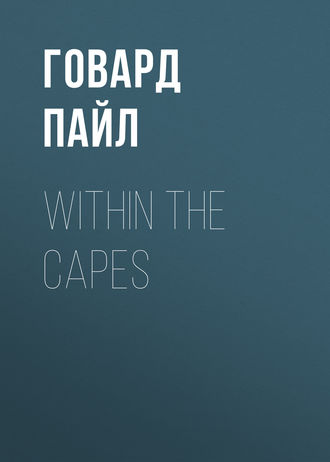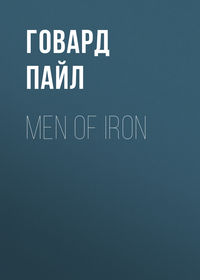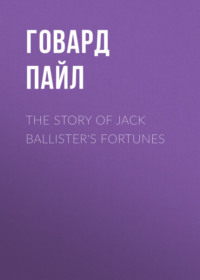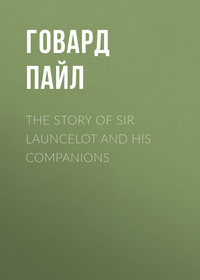 полная версия
полная версияWithin the Capes
I thank the Lord that his reason came back to him when it did. Another moment, and he would have been beating the life out of the poor terrified wretch at his knee. But suddenly, as though a cloud passed from before his eyes, he saw the white horror-struck face, the parted lips, and the staring eyes that were glaring up at him. Then he gave a cry so sharp that it rang in his own ears, and flinging down the stake, loosened his hold on Isaac.
He stood for a moment staring at the Friend, who staggered to his feet, and then sank down on a great rock that lay near to them, swaying this way and that, as though he were about to faint. Then Tom turned and ran.
The next minute he was out in the highroad.
Beside the bridge was a shallow pool, through which folks drove their teams in the summer time, and where they often stopped to water their horses. There was a black horse standing in the shallow now, and a man was sitting upon its back. Tom looked up as he ran out into the road, and saw that it was Mr. Moor.
Mr. Moor’s eyes were fixed upon his own with a very singular look, and it struck Tom how white his face was. But all this he saw only in one quick glance, for he turned the corner of the road, and ran toward home without stopping. There was a long and steep hill in front of him, and before he reached the top he fell into a walk, for he was panting and laboring for breath. After a while he reached the crest of the hill, and before him lay a level stretch of road; some distance along it he could see the tall cedars that stood around the old homestead farm-house. At last he came to where the long lane ran winding down from the house amongst the maple and ailanthus trees, and opened on the turnpike road through a gate that always stood open. Then Tom broke into a run again; up the lane he went, and so came at last to the paved porch at the back of the house, noticing as he passed, that Will Gaines’ horse and gig were standing beside the horse block across the road. Then he burst into the house, and into the best room.
All of the shutters were bowed but one, which was half opened, giving a faint light into the darkened room. Tom’s father and mother, his sister Susan, and his two elder brothers and Will Gaines were all there. His mother was sitting in a rocking chair, the tears running down her pale face, and Susan was fanning her with a palm-leaf fan. Will Gaines had told them of his coming, and Tom afterward found that his mother had fainted, and had only just recovered from her swoon.
“Mother!” cried he, and he ran to her and flung himself on his knees in front of her, burying his face in her lap, while great sobs shook him through and through.
No one spoke for a long time, but Tom felt his mother’s soft touch smoothing his hair. I think that they were all weeping at that time. I know that Susan was crying on the corner of the sofa, where she had flung herself, burying her face in the cushion. It was Will Gaines who spoke first.
“I guess I’ll go now,” said he, in a broken voice; and Tom presently heard him shutting the door softly behind him.
Then another space of dead silence followed, broken only by Susan’s catching breath. At last Tom’s mother spoke.
“Where has thee been, Thomas?” said she.
“I’ve been to see Patty, mother.”
“Oh, Tom! Tom!” cried Susan; and Tom could feel his mother’s hand trembling as it rested upon his head. Presently she spoke in an unsteady voice:
“Leave us for a little while, father; it’ll be best – just for a little while.”
Then the others went out, and they were left alone. Tom told all about his meeting with Patty, in broken and disconnected words. Every now and then he would stop, for there were times when the words that he sought to say would not come. He felt that his mother was crying, though she was crying silently. It was good for him to tell all of his troubles, for there are times when our sorrows gather upon us like great waters, that will overwhelm the soul if they do not find an outlet in speech.
Tom’s mother knew of the comfort that words bring with them, so she let him talk on, without saying anything herself. When he had ended, she spoke gentle and loving words to him, though she could give him no hope.
“I wish that I’d not seen Patty,” said Tom; “I wish that I’d come straight home as Will told me to do. Why didn’t he tell me of all this?”
“I suppose that he couldn’t bring himself to do it.”
“I wish I’d not seen her,” said Tom, again.
“It’s too late for wishing now,” said his mother.
Nothing more was said between them, and both knew that the marriage must be gone through with now. The time had been fixed for the wedding. It was for eleven o’clock the next morning. The friends had all been asked, the new house was furnished, the linen provided, and even Patty’s dresses made. It could not be stopped without great scandal to all concerned. If only he had not come back again. Then Patty would have been married quietly to a man whom she could respect, if not love, and her life would not have been without contentment. But now that she had seen him, what contentment could she have, loving him and marrying another man?
At last they quitted the room together; but the first bitterness had passed and gone. The first one whom he met was Susan. She flung her arms around his neck and kissed him, the tears brimming in her eyes as she did so.
“Dear, dear Tom,” said she, and Tom knew from the tone of her voice that she was thinking of Patty, though her name had not been spoken betwixt them.
“Don’t, Susan,” said he, huskily, for his heart was still very sore.
Then his father came and shook hands with him, as did William also, and presently John came over from the barnyard and joined them. This was all of the family that were at home, for Henry was in a store in Lancaster and Mary was visiting friends in Chester.
Friends, of the old times especially, were a restrained, self-repressed people, giving but little freedom to the flow of natural feeling. Tom’s father and his brothers had been moved – deeply moved; but now, when they came forward to shake him by the hand, excepting for the closeness of the grip that they gave him and the firmness of the pressure of palm to palm, no one would have thought that he had returned to them as the dead might return from the grave. It was, so far as any outward forms were concerned, as though he had but just come home after a two weeks’ absence.
After a few hesitating words of welcome, the men folks sat down and Tom began telling of those things that had befallen him in the year and a half past. He spun his yarn pretty steadily, though every now and then he would stop in his speech, for as he told of the finding of the money on the island, his words brought before him all of those hopes that had borne him up through the toil; then a rush of feeling would sweep over him as he thought how all this had been taken out of his life, and he would stop in his talking to steady himself. He said nothing of this to the others, but I think that they all felt the sorrow that was lying at the bottom of his heart. Then they sat down to supper.
Tom’s father tried to turn the talk more cheerfully.
“We haven’t told thee the great news, Thomas,” said he.
“What is it?” said Tom.
“Thee sees, thy coming upset us all, so that we didn’t think of it. Thee tell him, Susan.”
Susan looked down, and the color rose in her face.
“What is the news?” said Tom, again.
“Well,” said his father, “as Susan don’t seem inclined to tell thee, I suppose I must do it myself. How would thee like Will Gaines for a brother?”
Tom did not speak for a moment, then he said, a little unsteadily; “I – I wish thee joy, Susan; thee’s chosen a good man for thy husband, and I believe he’ll make thee happy.”
Then they were silent for a while.
“When is thee going to be married?” said Tom again, at last.
“The time’s not fixed yet; some time in the eleventh month, I guess.”
After a while Tom’s father spoke.
“What’s thee going to do now, Thomas?” said he.
“I don’t know exactly,” said Tom, huskily; “I’m going to Philadelphia again on the first stage to-morrow.”
His mother looked earnestly at him, and the tears rose in her eyes, and rolled slowly down her cheeks; then she pushed back her chair, and left the table hurriedly.
Presently they all arose and went into the sitting-room. There was a fire burning in the fireplace, for, though the days were warm, the evenings were cool and frosty. The four men sat down around the fire, smoking and talking together in a rambling fashion. Their words were constrained, for each felt upon his mind the parting that was to come to-morrow.
So the time passed until the old clock in the corner struck nine. Then Tom’s father arose in the way that Tom knew so well, and lit his candle with one of the paper lamplighters on the mantle shelf. Before he left the room he came to Tom and laid his hand on his shoulder.
“Thy burthen’s heavy, Thomas,” said he; “bear it like a man.”
“I’ll try,” said Tom.
“I wish that we could have thee longer with us, but thee’s doing right to go; thee mustn’t stay in the neighborhood just now.” He stood for a moment as though he were about to say something more; he did not speak again, however, but presently turned and left the room.
Such was Tom’s home-coming after a year and a half of shipwreck and misery. How had he looked forward to that home-coming, and how had it, like dead sea fruit, turned to bitterness in the mouth! Truly, it is kind in the good Father that he has given us to look into the past, and not forward into that which is to come. What hope would there be left in the world, if we could know the sorrows that were to come upon us in time?
CHAPTER XVI
IT oftentimes comes in this world that cares and troubles fall upon one, not in one deadly blow, but in stroke after stroke, as though to bear the man to the earth with their constant beating. Surely men’s souls are of tough fibre that they can so bend beneath such blows, beaten down only to rise again, bruised, wounded, but living. There is within a man a courage bred of hope that lives even in the darkest moments; a courage that lifts him up again out of the dust and supports him along his way, lame and sore, perhaps, but not broken down utterly.
So it was with Tom. Bitter troubles had come upon him during the past year and a half, and the bitterest and darkest of all had fallen upon him the day before. Still more were to come, and yet he has lived through these and others until his life has covered a span of nigh four score and ten, and at the end of them all he can still say that life is a pleasant thing.
Tom was up at the peep of day, for there were some things that he wished to take with him, and the packing of them must be done before breakfast time. He was to leave on the Enterprise stage, which passed the house about eight o’clock.
Little was said amongst the members of the family during breakfast time, and only a few words were spoken about his going. Half-past seven came and then Tom stood up and kissed his mother and Susan. Susan clung to him weeping; his mother’s eyes were full of tears, but they did not flow over.
“The Lord bless thee, my son!” said she, with trembling lips. These were all the words that she spoke.
“Come, Thomas,” said his father at last; “the stage’ll soon be along, and thee’ll miss it if thee don’t look out. I’ll walk down to the road with thee.”
“Farewell, William,” said Tom, shaking hands with his brother.
“Farewell, Thomas.”
“John – ”
“I guess I’ll walk down to the road with thee, Thomas. Let me carry thy bundle,” said John.
“Never mind; it’s very light,” said Tom.
They were silent as they went down the lane, and silent for a while as they stood at the roadside waiting for the stage; each was occupied with his own thoughts. At last John broke through the painful silence. “The stage is mighty late this morning,” said he, in a constrained voice.
“Thee’ll write to us, won’t thee, Thomas?” said his father, looking away as he spoke.
“Yes,” said Tom.
“Yonder’s the stage coming down Wilkes’ Hill,” said John.
But it was destined that Tom was not to go to Philadelphia that day on the Enterprise stage, or for some time to come.
“Who’s that coming up the road yonder,” said John.
“It looks like William Gaines,” said Tom’s father.
“It is Will Gaines,” said Tom.
So Will came galloping up to them, and then all three men saw from his face that he was the bearer of strange news. He leaped from his horse without a word of greeting, or without seeming to wonder why the three were standing there. His mind was too preoccupied to give attention to anything but his thoughts.
“Have you heard what’s happened?” said he.
“No.”
“What?”
Will hesitated for a moment and then said, in a solemn voice: “Isaac Naylor has been murdered!”
There was a space of dead silence.
“Isaac Naylor murdered!” said Tom’s father under his breath. Will nodded his head; he was looking straight at Tom; his face was very pale and there was a troubled, anxious look in his eyes.
“Murdered!” repeated John, mechanically, “where, when, how?”
“Ephraim Whiteley and his colored man found him at five o’clock this morning; his scull was beaten in with a piece of fence-rail!”
“My God!” cried Tom. He put his hand to his forehead, for horrible thoughts were passing through his mind. Could he – could he have killed Isaac? Was it a creation of his fancy that had left him sitting upon the rock, half strangled, but otherwise unhurt?
“Where did they find him?” said John, in a low voice.
“On the old mill road, about three hundred yards from the turnpike.”
Tom looked slowly about him; was he dreaming? Did he really hear the words that Will spoke?
The Philadelphia coach had come up to them, but no one had noticed its coming. They must have showed by their faces that something strange had happened, for the coach stopped when it came to where they were standing.
“What’s the matter?” cried old John Grundy, from the box.
“Isaac Naylor’s been murdered,” said John, in a low voice.
“My Lord! Isaac Naylor murdered!” Then, after a moment’s pause – “Where? – How? – When?” A half a dozen heads were thrust out of the coach windows by this time – they all listened in silence while John repeated that which Will had just told them. The coach went on down the road, but it did not take Tom with it.
Then Will turned to Tom – “Tom, I want to speak to you for a minute,” said he.
Tom stepped aside with him, without answering.
Will was holding his horse by the reins; he did not speak for a moment or two, but stood as though thinking what to say.
“Tom, have you seen Isaac Naylor since you’ve come back?” said he, at last.
“Yes.”
“Where?”
Tom hesitated before he spoke.
“Where?” said Will, again.
“At – at the place where they found him this morning,” said Tom. He looked straight at Will as he spoke, but Will turned his eyes away.
“Tom,” said he, “there’s a warrant out for your arrest.”
“Mine!”
“Yes; yours, Tom. I expect the constable’s on his way from Eastcaster now. Anyway, there’s no time to lose. Here’s a horse ready for you; jump on her and leave the country!”
“Will.”
“Well; what is it?”
“Do you believe that I killed Isaac Naylor?”
Will did not answer, but stood looking fixedly on the ground.
“Never mind; I don’t ask you to answer me, Will. I’ll tell you, however, that I did not do it. I’ll stay and face the music.”
Then Tom turned and called his father and John. “Father – John – did you hear what Will said?”
“No.”
“He said that there’s a warrant out against me for this thing.”
“A warrant out against thee?”
“Yes.”
“But thee hasn’t seen Isaac Naylor since thee came home, Thomas,” said his father.
“Yes, I did, father.”
“Where?”
“At the very place where he was murdered.”
Then he told all that had passed between him and Isaac Naylor, and of how near he had come to doing that of which he was accused. His father listened without a word, looking deeply and fixedly into Tom’s eyes the while. John was looking intently at him, too. Will was standing, turned half away. When Tom had ended, his father spoke to him in a low voice:
“Thomas.”
“Well?”
“Is – is that all? Has thee told us all?”
“Yes, father.”
“Why didn’t thee speak of it before?”
“I couldn’t bear to do it. I was afraid to tell how I had treated him – an overseer in the meeting.”
Tom’s heart crumbled within him at the silence that followed his words.
“Father,” he said, “so help me God, my hands are clean of this thing. Does thee suppose I’d have come home if I’d done it?”
“Wait a minute, Thomas; I’m thinking,” said his father. He stood picking at his finger-tips, and looking earnestly at them. At last he raised his head. “I don’t believe that thee did do it, Thomas. I can’t believe it.”
“Neither can I!” burst out John. “My brother couldn’t do a thing like that. My mother’s son couldn’t kill a man. I don’t believe it, and I can’t believe it!”
The tears sprang into Tom’s eyes at these words. He looked at Will, but Will’s head was still turned away. “Here comes the constable,” said he, at last, in a low voice.
A horse and gig had come up from behind Stony-Brook Hill. When it reached the level road between them and the crest of the rise the nag broke into a trot.
“Yes, that’s Johnson’s team,” said John, and then he turned his head away.
They all stood silently until at last the gig came up to where they were. The constable and his deputy were both in it. The constable drew up the horse, and threw the reins to the deputy. Then he stepped out and came over to where the others were standing, drawing a paper out of his breast-pocket as he did so. He had not said a word up to this time.
“I know what you’re coming for,” said Tom; “I’m ready to go with you, Johnson.”
“The Lord knows – I’d rather lose a hundred dollars, than have to do this,” said the constable.
“I believe you would,” said Tom.
“Can thee wait a little while, Eben?” said Tom’s father; “I’d like to drive over to Squire Morrow’s along with you. I’ll slip up to the house and gear Nelly to the wagon; it won’t take me a minute.”
The constable drew a watch out of his fob, and looked at it. “I guess I can wait a little bit, Mr. Granger,” said he; “the witnesses weren’t all at the squire’s when I left. You’ll have to step into the gig though, Tom, and I’ll – I’ll have to put cuffs on you.”
“Will you have to do that?”
“I’m afraid I will;” – he drew the hand-cuffs out of his pocket as he spoke; there was a sharp “click! click!” and Tom felt the cold iron circling his wrists.
His father groaned, and when Tom looked at him, he saw that his face was as white as wax. He turned, and he and John walked slowly up the lane toward the house.
Then Tom stepped to the gig, and climbed in beside the deputy constable. Johnson went to the roadside, and sat down on the bank. He sat with his elbows resting on his knees, and his hands hanging clasped together between them. Will stood leaning against the pailing fence, and nothing was said, excepting once when the constable spoke to his deputy.
“Better turn the hoss, Jos; you won’t have to do it then when Mr. Granger and John come back.”
After a while they saw John drive the farm-wagon over from the stable to the house. William was sitting beside him and presently Tom’s father came out of the house and climbed slowly into it. Then they drove down the road to where the others were waiting.
“Father, how did mother take the news?” said Tom.
“Very well! Very well! Better than I expected,” said his father, briefly; then he turned to Will: “Thee’d better go up to the house, William; I’d like thee to stay with mother and Susan while we’re gone.”
Will mounted his horse without a word, and, turning into the lane, galloped up to the house beneath the shadows of the trees.
“Are you all ready?” said the constable, standing with one foot on the step of the gig.
“All ready.”
Then he climbed in and they all drove away toward Eastcaster.
CHAPTER XVII
AS the gig rattled down the hill and past the end of Penrose’s road, Tom leaned forward and looked up toward the spot where he had met Isaac Naylor the day before. A knot of people had gathered about the place where the body had been found, collected there by the morbid curiosity that stirs men at such a time; they were talking earnestly together, some sitting on the fence, some leaning against it.
At last they reached the level road that led into Eastcaster, and the nag broke into a trot. The houses were clustered more thickly together around the outskirts of the town. Of course, the news had spread everywhere, and knots of people were gathered here and there talking the matter over. As the gig with the three men in it rattled along the stony street, the talk would be hushed in these groups, and the people would turn and gaze at the constables and their prisoner. Tom had not realized all that he would have to pass through till now; he had not known what it would be to have his neighbors and old acquaintances staring at him with that look of mixed curiosity and horror. He shrunk together in the gig back of the constables, striving to hide himself behind them. Johnson must have known how he felt, for he laid the whip to the horse and drove on as fast as possible.
At last they reached Squire Morrow’s office, at the corner of Market and Andover streets. It was a small, dark two-storied building, with an old-fashioned hipped roof; – it has since been torn down to make way for Prettyman’s new store. A great crowd had gathered around the corner about the squire’s office, and they could see through the windows that the room was packed with the people inside. The gig drew up to the sidewalk and the constable stepped down out of it.
“You’ll have to get down, now, Tom,” whispered Jos Giddings, the deputy, in Tom’s ear. Then Tom stepped out and the deputy followed him. The constable had a great deal of trouble in pushing his way through the people, for they crowded up very closely to get a look at Tom. He walked with his eyes fixed straight ahead of him; he saw nothing but the crown of the constable’s hat, but he knew, as well as though he had looked about him, that a mass of faces were gazing at him with eager and intense curiosity. He also knew that his father and his brothers, John and William, had gotten out of the farm wagon and were following close behind him.
“Stand out of the way there!” said the constable, in a loud voice, as he pushed into the office, and then Tom found himself standing beside a railing that separated the squire’s desk from the mass of people packed into the body of the office. The light came through a little window in the end of the room, so that Tom could see things only duskily after coming in from the dazzling glare of the sunlight outside. Mr. Morrow was sitting at his desk, leaning back in his chair, with a very troubled look in his eyes. He was playing absently with a pen that lay on the table in front of him.
“Won’t the prisoner sit down, constable?” said he; “he looks pretty badly.”
“I don’t care to sit down,” said Tom, “I’d rather stand.” He was resting with his handcuffed hands on the railing in front of him; after a while he collected his courage, and then he looked slowly around him.
A number of people were sitting inside of the railing; the first one that he saw was Patty Penrose, and on her his eyes lingered long and painfully. She was very white, and dark rings encircled her eyes. She sat with her handkerchief in her hand, and she wiped the slow tears from her cheeks with it every now and then. Her father sat beside her, looking very hard and stern. He did not glance at Tom until later in the examination that followed. Just behind Elihu Penrose sat Mr. Moor. He, too, was very pale, and every now and then he wiped his face with a bandana handkerchief. Beside these three were Ephraim Whiteley and his colored man, Mrs. Bond, the landlady of the Crown and Angel, and Dr. Winterapple.
Then Tom looked up and saw that his father and his two brothers stood beside him.
The first witness called was Ephraim Whiteley. He was tall, ungainly, round shouldered and loose jointed. He was an elderly man; a very plain Friend, and, like Isaac Naylor, was one of the overseers of the meeting.









